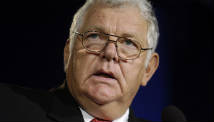STORY HIGHLIGHTS
- Howard Kurtz: Conventional wisdom is that media will lose interest in guns
- He says that's been the pattern of media behavior after Columbine, other shootings
- This time seems like it might be different, he says
- Kurtz: Reporters profoundly shaken by story, should stay on it
Editor's note: Howard Kurtz is the host of CNN's "Reliable Sources" and is Newsweek's Washington bureau chief. He is also a contributor to the website Daily Download.
(CNN) -- The conventional wisdom is that Newtown has just a few more days to run as a major media story.
The reporters are pulling out of the grief-stricken Connecticut town, which means no more live shots every hour. The White House press corps responded to President Obama's announcement Wednesday of a task force on gun control with the first three reporters asking about the impending fiscal cliff. And after every previous mass shooting, from Columbine to Aurora, the media's attention has soon drifted away.
But I believe this time will be different.

Howard Kurtz
I believe the horror of 20 young children being gunned down has pricked the conscience of those in the news business, along with the rest of America.
I could be wrong, of course. The press is notorious for suffering from ADD.
But every conversation I've had with journalists has quickly drifted to this subject and just as quickly turned intense. Most have talked about how their thoughts have centered on their children, and grandchildren, and the unspeakable fear of anything happening to them. All have spoken about how hard it is to watch the coverage, and many have recalled crying as they watch interviews with the victims' families, or even when Obama teared up while addressing the nation.
Watch: Blaming Jon Stewart for the Newtown Shootings?
I've watched Fox's Megyn Kelly choke back tears on the air after watching an interview from Newtown. I've heard CNN's Don Lemon admit that he is on the verge of crying all the time. I've seen MSNBC's Joe Scarborough, a former Republican congressman, say that day in Connecticut "changed everything" and prompted him to rethink his longstanding opposition to gun control, which earned him top ratings from the NRA.
Maybe Newtown will be the 9/11 of school safety.
Watch: Media Fantasy: Touting Ben Affleck (Uh Huh) for the Senate
The media paid scant attention to gun control in the past, in part because of a conviction that the NRA would block any reform on Capitol Hill. At the same time, they took their cue from the fact that officeholders in both parties were avoiding the issue at all costs—Republicans because they mainly support the status quo, Democrats because they mostly deem it political poison.
But since when is it our job solely to take dictation from pols? When it comes to subjects like climate change and same-sex marriage, the press has been out ahead of the political establishment. Given the carnage in Newtown as the latest example, journalists should demand whether we can do better. The fact that Obama now promises to submit gun legislation to Congress will help the narrative, but it shouldn't be a mandatory requirement for coverage.
Watch: From Joe Scarborough to Rush Limbaugh, the conservative media meltdown
This is not a plea for a press-driven crusade for gun control. In fact, it's imperative that journalists be seen as honest brokers who are fair to all sides. MSNBC anchor Thomas Roberts, in an interview with Republican Rep. Jack Kingston of Georgia, who opposes gun restrictions, said: "So we need to just be complacent in the fact that we can send our children to school to be assassinated." That is demonization, just as some conservative pundits are unfairly accusing liberal commentators who push for gun control of "politicizing" a tragedy or of pushing God out of the public schools.
The question of school safety extends beyond guns to mental illness and societal influences. With even some NRA supporters asking why law-abiding hunters need automatic rifles with high-capacity magazines, it's time for a nuanced debate that goes beyond the usual finger-pointing. Bob Costas got hammered for using an NFL murder-suicide to raise the gun issue during a halftime commentary, but he was right to broach the subject.
Here is where the media have not just an opportunity but a responsibility. The news business has no problem giving saturation coverage to such salacious stories as David Petraeus' dalliance with Paula Broadwell. Isn't keeping our children safe from lunatics far more important by an order of magnitude?
I think the press is up to the challenge. Based on what I've heard in the voices of people in the profession, they will not soon forget what happened in Newtown. And they shouldn't let the rest of us forget either.
Follow @CNNOpinion on Twitter
Join us at Facebook/CNNOpinion
The opinions expressed in this commentary are solely those of Howard Kurtz.














